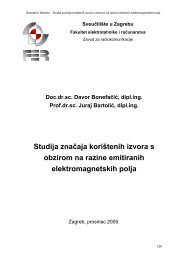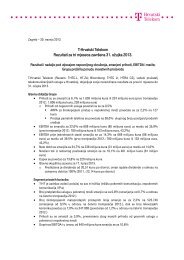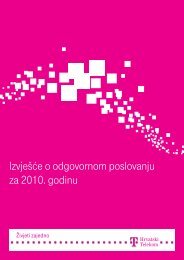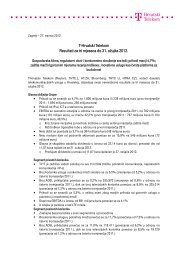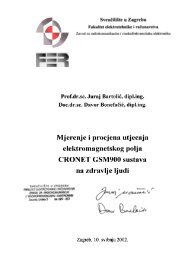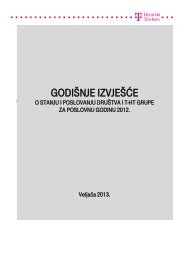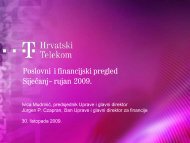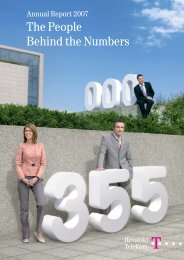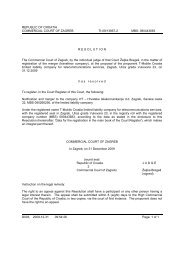Annual Report 2011 - T-Hrvatski Telekom
Annual Report 2011 - T-Hrvatski Telekom
Annual Report 2011 - T-Hrvatski Telekom
You also want an ePaper? Increase the reach of your titles
YUMPU automatically turns print PDFs into web optimized ePapers that Google loves.
80<br />
Consolidated financial statements<br />
unable to comply with IFRSs because its functional<br />
currency was subject to severe hyperinflation. The<br />
amendments will not have any impact on the Group’s<br />
financial position or performance because the Group<br />
is not first time adopter.<br />
IAS 12 Income Taxes — Deferred Taxes (effective for<br />
annual periods beginning on or after 1 January 2012)<br />
IAS 12 Income taxes, currently requires an entity<br />
to measure the deferred tax relating to an asset<br />
depending on whether the entity expects to recover<br />
the carrying amount of the asset through use or sale.<br />
It can be difficult and subjective to assess whether<br />
recovery will be through use or through sale when the<br />
asset is measured using the fair value model in IAS<br />
40 Investment property. This amendment therefore<br />
introduces an exception to the existing principle for<br />
the measurement of deferred tax assets or liabilities<br />
arising on investment property measured at fair<br />
value. As a result of the amendments, SIC 21 Income<br />
taxes - recovery of revalued non-depreciable assets,<br />
will no longer apply to investment properties carried<br />
at fair value. The amendments also incorporate into<br />
IAS 12 the remaining guidance previously contained<br />
in SIC 21, which is withdrawn. The Group does not<br />
expect that amended IAS 12 will have an impact on<br />
the financial statements of the Group as the Group<br />
currently does not have any investment property or<br />
non-depreciable asset which is measured using the<br />
revaluation model.<br />
Amendment to IAS 1 Financial Statement<br />
Presentation Regarding Other Comprehensive<br />
Income (effective for annual periods beginning on or<br />
after 1 July 2012)<br />
The main change resulting from these amendments<br />
is a requirement for entities to group items presented<br />
in ‘other comprehensive income’ (OCI) on the basis<br />
of whether they are potentially reclassifiable to profit<br />
or loss subsequently (reclassification adjustments).<br />
The amendments do not address which items are<br />
presented in OCI. The amendment affects presentation<br />
only and therefore is not expected to have an impact on<br />
the Group’s financial position or performance.<br />
Amendment to IAS 19 Employee Benefits (effective for<br />
annual periods beginning on or after 1 January 2013)<br />
These amendments eliminate the corridor approach<br />
and calculate finance costs on a net funding basis.<br />
The amendment could have an impact on the Group’s<br />
financial position or performance.<br />
IFRS 9 Financial Instruments (effective for annual<br />
periods beginning on or after 1 January 2013)<br />
IFRS 9 is the first standard issued as part of a wider<br />
project to replace IAS 39 Financial Instruments:<br />
Recognition and Measurement. IFRS 9 retains<br />
but simplifies the mixed measurement model and<br />
establishes two primary measurement categories<br />
for financial assets: amortised cost and fair value.<br />
The basis of classification depends on the entity’s<br />
business model and the contractual cash flow<br />
characteristics of the financial asset. The guidance in<br />
IAS 39 on impairment of financial assets and hedge<br />
accounting continues to apply. The Group does not<br />
expect IFRS 9 to have an impact on the financial<br />
statements. The Group plans to adopt this new<br />
standard on its effective date.<br />
IFRS 10 Consolidated Financial Statements (effective<br />
for annual periods beginning on or after 1 January<br />
2013)<br />
The objective of IFRS 10 is to establish principles<br />
for the presentation and preparation of consolidated<br />
financial statements when an entity controls one<br />
or more other entity (an entity that controls one or<br />
more other entities) to present consolidated financial<br />
statements. Defines the principle of control, and<br />
establishes controls as the basis for consolidation.<br />
Set out how to apply the principle of control to<br />
identify whether an investor controls an investee<br />
and therefore must consolidate the investee. Sets<br />
out the accounting requirements for the preparation<br />
of consolidated financial statements. The Group is<br />
currently assessing the impact that IFRS10 will have<br />
on financial statements. The Group plans to adopt<br />
this new standard on its effective date.<br />
IFRS 11 Joint Arrangements (effective for annual<br />
periods beginning on or after 1 January 2013)<br />
IFRS 11 is a more realistic reflection of joint<br />
arrangements by focusing on the rights and obligations<br />
of the arrangement rather than its legal form. There are



